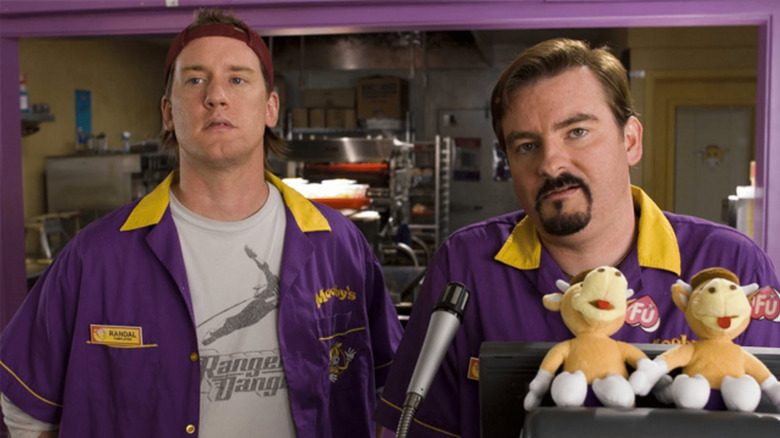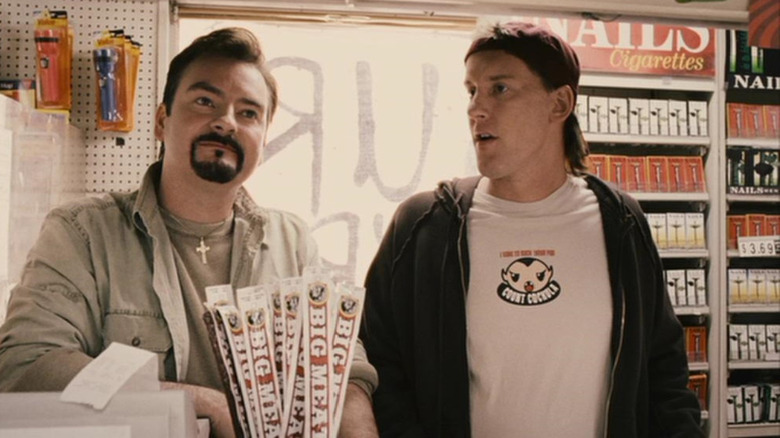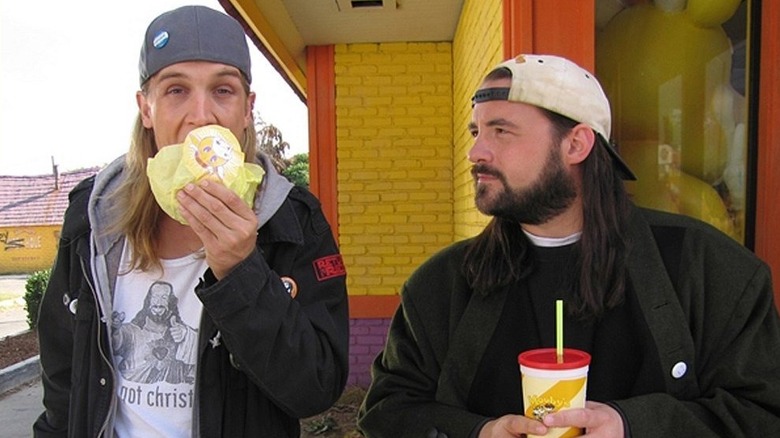Kevin Smith Used A Simple Camera Trick To Sell The Bittersweet Ending Of Clerks II
Kevin Smith has directed eight feature films since 2006's "Clerks II" — including "Clerks III," it so happens — but "Clerks II" might function best as the coda to his body of work. In the film, Dante (Brian O'Halloran) and Randall (Jeff Anderson), now in their early 40s, have been reduced to working at a low-price fast food joint called Mooby's to make ends meet. Dante is poised to marry his fiancée Emma (Jennifer Schwalbach) and move to Florida to run a car wash. This has Dante facing an existential crisis, as he is actually in love with his manager Becky (Rosario Dawson), with whom he had an affair. Randall, too, is thrown into an existential crisis by the impending absence of his best friend. The future doesn't look bright. The decisions these characters make in "Clerks II" will essentially come to define their adulthoods, and they are still, in many ways, cemented in their adolescence.
The end of "Clerks II" is a bold statement from the film's director. After an elaborate climax involving an after-hours farewell party, a break-up, and a donkey show gone awry, Dante and Randall find themselves in prison with well-known local stoners Jay (Jason Mewes) and Silent Bob (Smith). Randall confesses that his life will be adrift without Dante in it, and that he was actually happiest back in the days of the first "Clerks" movie when they were wage slaves at the Quick Stop convenience store and RST Video store. Using capital offered by Jay and Silent Bob, Dante and Randall elect to buy their old stores and operate as their owners.
Frustrated incorporated
The final shot of "Clerks II" is of Dante and Randall behind the counter of the Quick Stop, exactly where they were a decade earlier. Soul Asylum's 1995 song "Misery" (the one with the lyric "frustrated incorporated" in its chorus) plays on the soundtrack. The film fades from color to black and white as Dante and Randall settle into their new groove ... which was their old groove. "Today is the first day of the rest of our lives," Dante says.
In a recent interview with Vanity Fair, Smith looks at that moment as deeply ambivalent. The characters triumph in achieving their own dream, but ... it's not a very ambitious dream. Dante and Randall have grown up, but they also haven't grown up. They have chosen to stagnate in their 20s. As Smith put it:
"In the last shot they're in the store that they now own, masters of their own destiny, and as we pull back, it goes from color back to black and white because, you know, you have to be careful what you wish for. Those dudes are like, 'Yeah, man, now we own the store!' But they're still at the store."
One might apply that same ambivalence to Smith himself. The statement of "Clerks II" appears to be a filmmaker admitting to never really growing beyond his origins. He's announced that he essentially has nothing left to say, and that his defining ethos was right there at the beginning. At this point in his career, Smith seemed to be having more fun as a podcaster and public speaker than a filmmaker. What's more, he was writing comic books on the side. "Clerks II" might be considered his retirement. If you want more "Clerks," just go back to the beginning again.
Smitharc
Looking back, one can see a definite mytharc in Smith's career. A Smitharc, if you will. He explored twentysomething relationships with "Clerks" and "Mallrats," discussed sexuality and growing up in "Chasing Amy," and tackled his own faith in "Dogma." His 2003 film "Jay and Silent Bob Strike Back" seemed to be Smith's attempt at a grand finale for Generation X and how their objects of affection are poised to be corporatized — a prescient film upon reflection. Smith's 2004 film "Jersey Girl" was his announcement that he had mellowed out when he became a parent; his daughter, Harley, was born in 1999. "Clerks II," in returning to his first feature, appeared to be Smith closing his own door.
In 2010, "Red State" was a comment not only on the monsters in the Westborough Baptist Church, but specifically his own encounters with them following the release of "Dogma." Note that it was a comment on a reaction to one of his own films, and not a new thesis. Since then, Smith has sort of noodled around with films, making the awful "Tusk" as a throw-off larf, and "Yoga Hosers," just so he could do something with his daughter and her best friend. The less said about "Cop Out," the better. "Clerks III" felt very much like a return to one's favorite 20s hangout when one is 50. It was a nostalgia trip, made only to revisit old gags and reunite with old friends. Smith said as much in a spoken thank-you letter he played over the credits.
Smith's movies since "Clerks II" have been a chance to behave personally, with Smith making movies entirely for himself. If an audience happens to see them and enjoy them, then that's fine too.


